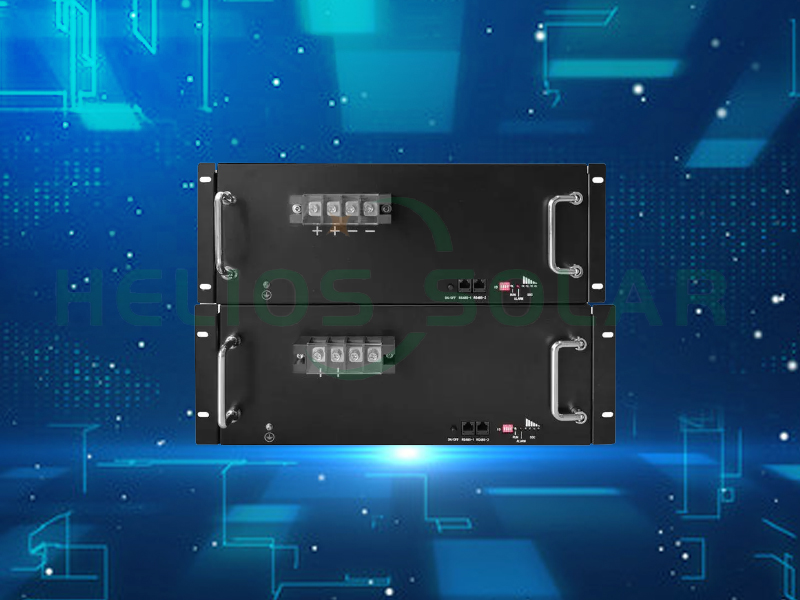In the growing field of energy storage solutions, rack-mountable lithium batteries have become a popular choice for commercial and industrial applications. These systems are designed to provide reliable, efficient and scalable energy storage, making them ideal for a variety of uses from data centers to renewable energy integration. This article takes an in-depth look at the specifications of rack-mounted lithium batteries, highlighting their features, benefits, and applications.
1. Capacity
The capacity of rack-mounted lithium batteries is usually measured in kilowatt hours (kWh). This specification indicates how much energy the battery can store and deliver. Common capacities range from 5 kWh to over 100 kWh, depending on the application. For example, a data center may require greater capacity to ensure uninterrupted power supply, while a smaller application may require only a few kilowatt-hours.
2. Voltage
Rack-mounted lithium batteries typically operate on standard voltages such as 48V, 120V or 400V. Voltage specification is critical because it determines how the battery is integrated into the existing electrical system. Higher voltage systems can be more efficient, requiring less current for the same power output, thus reducing energy losses.
3. Cycle life
Cycle life refers to the number of charge and discharge cycles a battery can go through before its capacity decreases significantly. Rack-mounted lithium batteries typically have a cycle life of 2,000 to 5,000 cycles, depending on depth of discharge (DoD) and operating conditions. Longer cycle life means lower replacement costs and better long-term performance.
4. Depth of Discharge (DoD)
Depth of discharge is a key indicator of how much battery capacity can be used without damaging the battery. Rack-mounted lithium batteries typically have a DoD of 80% to 90%, allowing users to utilize most of the stored energy. This is particularly beneficial for applications that require frequent cycling, as it maximizes the use of the battery’s available energy.
5. Efficiency
The efficiency of a rack-mounted lithium battery system is a measure of how much energy is retained during charge and discharge cycles. High-quality lithium batteries typically have a round-trip efficiency of 90% to 95%. This means that only a small portion of the energy is lost during charging and discharging, making it a cost-effective energy storage solution.
6. Temperature Range
Operating temperature is another important specification for rack-mounted lithium batteries. Most lithium batteries are designed to operate efficiently within the temperature range of -20°C to 60°C (-4°F to 140°F). Keeping the battery within this temperature range is critical for optimal performance and longevity. Some advanced systems may include thermal management features to regulate temperature and enhance safety.
7. Weight and Dimensions
The weight and size of rack-mounted lithium batteries are important considerations, especially when installing in limited space. These batteries are typically lighter and more compact than traditional lead-acid batteries, making them easier to handle and install. A typical rack-mounted lithium battery unit may weigh between 50 and 200 kilograms (110 and 440 pounds), depending on its capacity and design.
8. Security Features
Safety is critical to energy storage systems. Rack-mounted lithium batteries have multiple safety functions such as thermal runaway protection, overcharge protection, and short circuit protection. Many systems also include a battery management system (BMS) to monitor the health of the battery to ensure safe operation and extend its service life.
Application of rack-mounted lithium battery
Rack-mountable lithium batteries are versatile and can be used in a variety of applications, including:
- Data Center: Provides backup power and ensures uptime during power outages.
- Renewable Energy Systems: Store energy generated by solar panels or wind turbines for later use.
- Telecommunications: Providing reliable power to communication networks.
- Electric Vehicles: Energy storage solutions as charging stations.
- Industrial Applications: Support manufacturing and logistics operations.
In conclusion
Rack-mounted lithium batteries represent a major advance in energy storage technology. With their impressive specifications, including high capacity, long cycle life and outstanding efficiency, they are ideally suited for a wide range of applications. As the demand for reliable and sustainable energy solutions continues to grow, rack-mounted lithium batteries will play a vital role in shaping the future of energy storage. Whether for commercial, industrial or renewable energy applications, these systems provide robust and scalable solutions to meet today’s and future energy needs.
Post time: Oct-30-2024


